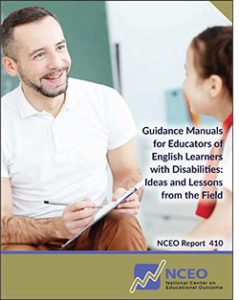 NCEO published a report, Guidance Manuals for Educators of English Learners with Disabilities: Ideas and Lessons from the Field (NCEO Report 410), written by Elizabeth Burr (WestEd). This report describes ideas and lessons learned from leaders who developed state education agency and local education agency guidance manuals for identifying, assessing, and referring English learners (ELs) to special education.
NCEO published a report, Guidance Manuals for Educators of English Learners with Disabilities: Ideas and Lessons from the Field (NCEO Report 410), written by Elizabeth Burr (WestEd). This report describes ideas and lessons learned from leaders who developed state education agency and local education agency guidance manuals for identifying, assessing, and referring English learners (ELs) to special education.
Researchers, policymakers, and educators are increasingly focused on the accurate identification, assessment, and referral of ELs with disabilities, stemming in part from both the under- and over-identification of ELs for special education services compared to non-ELs identified for these services.
Appropriate decision making is important because ELs with disabilities who are not identified will miss out on services that they need. Conversely, ELs who are misidentified as having a disability receive special education services that they do not require, which may reduce time available for EL services and participation in the general classroom, potentially reducing access to rigorous academic content, and result in social stigma. To ensure that students are receiving optimal instruction and appropriate interventions and assessments, state, district, and school leaders will need to develop or improve the systemic processes educators and administrators work through. Providing manuals with consistent and practical guidance (and professional learning on their use) is one means to do so.
The purpose of this report is to describe ideas and lessons learned from leaders in four states (Connecticut, Michigan, Minnesota, and Virginia), a statewide association (Special Education Local Plan Area [SELPA] Administrators of California Association), and a school district (San Diego Unified School District [SDUSD]), all of which have developed manuals. It is hoped that these ideas and lessons will assist leaders who are creating or are in the process of revising procedures and policies of their own.
This report presents findings from telephone interviews conducted with the authors of six manuals from December 2017 to January 2018, probing the impetus for getting started; the manual development process; dissemination and professional learning; and lessons learned during manual development. Findings from the interviews suggest many lessons learned. For example, while there are significant barriers related to system-wide improvements (such as lack of interpreters, staff capacity to conduct trainings, turnover, the time it takes to find new ways of working, and inequitable opportunity for implementation), there also were successes in this area, including more informed practice (e.g., awareness of extrinsic factors and new collaborations among educators) and policy or organizational changes.
